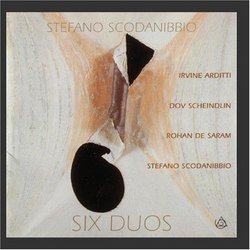Mixed expressions here, too much dependance on what we alrea
scarecrow | Chicago, Illinois United States | 09/01/2005
(3 out of 5 stars)
"Stefano Scondanibbio has an incredible sensitivity to timbre,string,contrabass,but simply timbre as it is constituted.He is equally at home with any string instrument and frequently travels with a cello opting out for the burdensome lumbering of travel with a contrabass; that's why we listen to him, He is an engaging minimalist like performer, barely making motions, almost Webern like in their economy,suggestion,import and mystery. He usually improvises his works,except for the long ones, he has a one hour work after Deleuze,on the layering dimensions of postmodernity,how things objects can be created at will, with every intensified degree of linear and conceptual association possible, uniting differed fragments of timbre, and making it whole, making it cohere to some expression. Of course as Cornelius Cardew said some place that the creator is in the end the "unifier" of the most nefarious regions of materials in music, that a responsibility resides with the one breaking/making timbre into durations.He was of course speaking of improvisation as the highest form of communication.Scondanibbio's master work here(not on this CD) is with antiphonal effects throughout the performance space,where he plays with lighting design and computer generated sequencing on stage.I experienced this at LACMA in April 2003.
Many times within the avant-garde there are those musicians who think they can cross conceptual boundaries and still they encompass whatever is necessary, the demands of the music to project the content of timbre wherever and whenever it is a necessity with interesting results.
Here all these pieces are written out and the results are mixed. I have a preference for the low partials the basso timbres, the voices downunder. I get tired of the stereotypical avant-garde string harmonic done ad infinitum, ad nauseaum now by the repertoire the Arditti cultivate. It is simply an expressive and conceptual deadend if no new conceptual framework is brought to it, as the late string music of Luigi Nono attests.
These are early works of Scondanibbio,who had worked with Nono on his "Prometeo" for a time in/ from the Eighties. "Escondido" is perhaps a reference to Oaxaca Mexico,perhaps not, where he has frequently performed. I don't know, but this is an unengaging sterile work, again with tight pencil thin violin harmonics,unadorned, crafted into some shapes that Arditti plays with the utmost third person reserve possible, like he is not even there, a mere conduit for exchange.Curious again in how in Nono's string music the "Hay que caminar sonando" a violin duet these same materials seem to point to the vagaries of the century, an endpoint, whereas here they seem unattached, unfulfilled, "homeless" in a way.You never sense the primordial power capable within the string timbre here. Like wise Rohan de Sarem,cellist has more of a flair a desire to step out of the avant-garde standard commonplace repertoire and utilize his elegant playing for something else.He has even performed with AMM to interesting results.With him included here on "Humboldt" is quite euphonious, quite resonant with some expressive characters coming to the surface.Wonderfully played and great dialogue between him and the Contrabass who holds a quasi-accompanimental role. I think Scondanibbio's creativity in written notational music is wholly different and uninspired, "imprisoned" in a way in the avant-garde lingua franca than his more freely improvised works;his "oriente-occidente", or "strumentale" or the more interesting "Sei Studi". That is an entirly different language and expressive regions than here exhibited that he and Arditti has come to depend, like a Lacanian comfort zone engaging the "object petit a", the discourse of the divided self. The music is uninteresting and the creativity reaches a dead end impasse very quickly."


 Track Listings (6) - Disc #1
Track Listings (6) - Disc #1